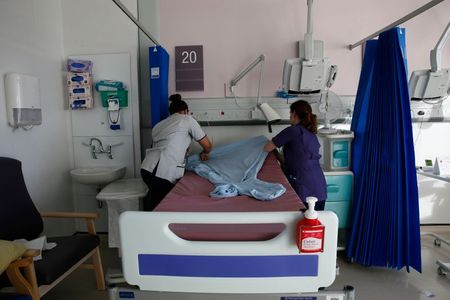By Ruhi Soni
(Reuters Health) – People in the healthcare industry are less likely than those in sports and the arts to be awarded British honors like knighthoods and damehoods, a study suggests.
British researchers sought to understand which fields are more likely to receive New Year’s Honours, an annual national award given by the British monarch to recognize extraordinary contributions to UK society across different sectors.
The honors system is led by the Honours and Appointments Secretariat of the UK Cabinet Office.
The researchers, led by Dr. John Emelifeonwu, a neurosurgery trainee at the Western General Hospital in Edinburgh, Scotland, found that a career in healthcare might not be considered quite as “honorable” as one in sports, arts and the media.
After crunching the numbers on a decade’s worth of recipients, Emelifeonwu and his team found that, in general, people in sports were about 22 times more likely than healthcare workers to receive an honor.
The findings, published in British Medical Journal, also showed that people in arts and media professions received 5.8 times more honors than health industry workers.
Business and economics professionals, and those in civics and politics, also had better odds than their medical counterparts.
People in science and technology sectors, on the other hand, had roughly the same chance as health workers of receiving an honor.
Emelifeonwu was inspired to conduct the analysis after emails of English soccer player David Beckham were leaked in early 2017.
Dubbed “Beckileaks,” the hacked emails revealed Beckham’s displeasure when he did not receive a knighthood.
Emelifeonwu said he was preparing for emergency surgery at odd hours when he heard the news.
“I was acutely aware that I was calling people in to take them away from their family or loved ones to come to an operation,” he said in a phone interview.
“I just thought that contrasts to a sporting superstar asking or complaining about not receiving an honor!”
Ten sector-specific expert committees consider nominations of British citizens, which can be submitted by the general public.
The committees also decide which “tier” of honor a nominee receives. Higher-order honors include knighthoods and damehoods, which allow people to add “Sir” and “Dame” as prefixes to their names.
Past recipients include actress Keira Knightley, fashion designer Ralph Lauren and antibiotics discoverer Alexander Fleming.
Study authors note that they do not know why potential bias may arise.
“It may just be because the healthcare system employs so many people, the relative representation is lower in health,” Emelifeonwu said.
In a statement responding to the study, a Cabinet Office spokesperson highlighted that New Year’s Honours are only half the honors awarded annually as there is an honors list published for the Queen’s birthday in June every year as well.
The Cabinet Office also notes that a large majority of those who receive honors are being recognized for volunteering work.
“Over two-thirds of honours are awarded to people who have undertaken outstanding (volunteering) work in their communities, including many working in health related sectors. This was not reflected in this report,” the statement points out.
Both Emelifeonwu and the Cabinet Office recognize the importance of nominations.
While a UK government website (https://bit.ly/35MMeYh) about the Honours System mentions factors that play a role in selection of recipients, such as background checks and the annual focus of the committees, the Cabinet Office notes that “the number of honours awarded is also somewhat dependent on the amount of nominations put forward.
“We recognise there is a need to raise awareness of how to nominate someone for an honour – particularly more widely to groups who are underrepresented on the list,” the Cabinet Office writes.
Emelifeonwu urges the general public to think about the various people involved in caring for their loved ones, from doctors and nurses, to physiotherapists and cooks at hospitals.
“Think about whether anyone is going above and beyond. And if you feel that person is, then think about writing a letter to your local politician or the Cabinet Office.”
SOURCE: https://bit.ly/2MpSLR0 The BMJ, online December 18, 2019.


